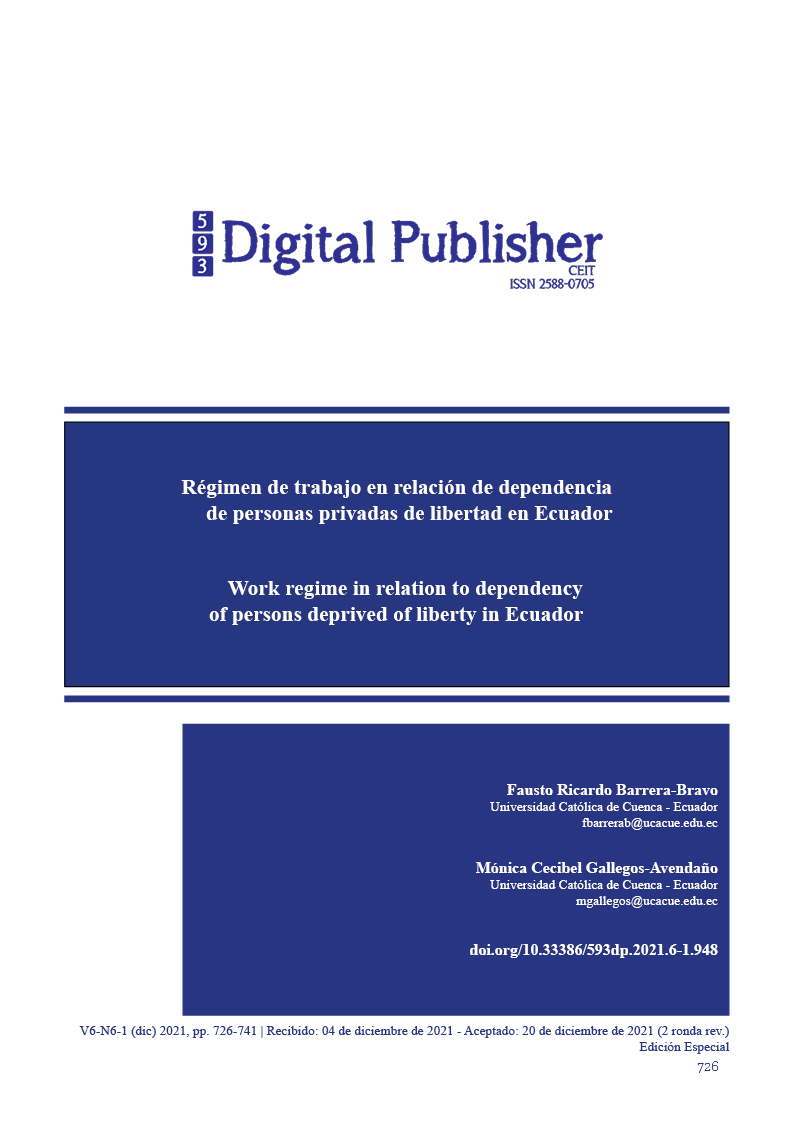Work regime in relation to dependency of persons deprived of liberty in Ecuador
Main Article Content
Abstract
The regulations in force in Ecuador consider work as an economic-social right and duty and guarantee the right to work of all people, thus regulating labor relations between workers and employers within the various modalities and working conditions. The Comprehensive Organic Criminal Code, recognizes work as a right and guarantee of persons deprived of liberty, allowing its development through associations for productive and commercial purposes, also mentions that the purpose of the social rehabilitation system is the development of capacities of persons deprived of liberty and the exercise of their rights for their social and economic reintegration. The Labor Code establishes that work is a right and a social duty that all people must comply with, however, it does not mention the form of regulation or the way in which the employment relationship would be applied when dealing with persons deprived of liberty. The Ministry of Justice, Human Rights and Religion as the governing body in public policies in penitentiary matters, together with the Ministry of Labor, the governing body in policies that guarantee equal employment opportunities, approved the Interministerial Agreement No. MDT-2015, of 22 of May 2015, which aims to regulate work activities with people deprived of liberty.
Downloads
Article Details

This work is licensed under a Creative Commons Attribution-NonCommercial-ShareAlike 4.0 International License.
1. Derechos de autor
Las obras que se publican en 593 Digital Publisher CEIT están sujetas a los siguientes términos:
1.1. 593 Digital Publisher CEIT, conserva los derechos patrimoniales (copyright) de las obras publicadas, favorece y permite la reutilización de las mismas bajo la licencia Licencia Creative Commons 4.0 de Reconocimiento-NoComercial-CompartirIgual 4.0, por lo cual se pueden copiar, usar, difundir, transmitir y exponer públicamente, siempre que:
1.1.a. Se cite la autoría y fuente original de su publicación (revista, editorial, URL).
1.1.b. No se usen para fines comerciales u onerosos.
1.1.c. Se mencione la existencia y especificaciones de esta licencia de uso.
References
Arandia, J. (2018). La reinserción laboral en las personas privadas de libertad en el Cantón Quevedo. Uniandes EPISTEME, 5(3), 1348–1359.
Azócar, R., Leyton, J., Santibáñez, M., & Sanhueza, G. (2018). El trabajo de las personas privadas de libertad en Chile: hacia la [re]inserción social y laboral. CENTRO DE POLÍTICAS PÚBLICAS, 13(11), 22.
Baltán, L. (2019). Enfoque criminológico del derecho al trabajo de las personas privadas de libertad en el Ecuador. Utopía y Praxis Latinoamericana, 24(2), 190–218.
Calicchio, M., Silva, M., & Barsaglini, R. (2020). Being related to persons deprived of liberty: repercussions on the experiences of mothers and partners. Revista Família, Ciclos de Vida e Saúde No Contexto Social, 8(3), 337. https://doi.org/10.18554/refacs.v8i3.4028
Chasi, M., & Velásquez, Á. (2021). INFLUENCIA COMUNICACIONAL DEL PERSONAL PENITENCIARIO EN LAS PERSONAS PRIVADAS DE LIBERTAD EN LA ETAPA DE MUJERES DEL CENTRO DE PRIVACIÓN DE LIBERTAD REGIONAL SIERRA CENTRO NORTE COTOPAXI. NEXUS REVISTA, 1(22).
Haro, A., Tite, R., & Espín, H. (2020). RÉGIMEN SEMI ABIERTO EN EL SISTEMA PENITENCIARIO ECUATORIANO. Revista Científica y Arbitrada de Ciencias Sociales y Trabajo Social ‘“Tejedora,”’ 3(5), 11–16.
Hassan, N., & Rosly, M. A. A. (2021). Vocational Education and Training for Young Offenders in Juvenile Approved Schools. International Journal of Academic Research in Progressive Education and Development, 10(1), 642–650. https://doi.org/10.6007/ijarped/v10-i1/9620
Lopes, A. M. D., Pereira, M. L. Q., & Marques, L. V. B. (2021). The incorporation of women’s empowerment principles (WEPs) as criteria for granting the national social responsibility seal for prison work (RESCUE). Research, Society and Development, 10(12), e100101220249. https://doi.org/10.33448/rsd-v10i12.20249
Moreno, R., Patricia, D., & Pineda, P. (2019). Resilience in families of the Colombian army with a member deprived of liberty. Resilience in Families of the Colombian Army with a Member Deprived of Liberty, 21(2), 89–107.
Ochilova, S. (2021). What Is Probation Itself? What Kind of System Is It? Ochilova. International Journal of Multicultural and Multireligious Understanding, 8(9), 458–462.
Palaming, G. (2020). Community’s Perception towards Women Deprived of Liberty. International Journal of Innovative Science and Research Technology ISSN, 5(12), 1146–1151.
Proca, F. (2021). Working Behind Bars , General Rules for Penitentiary Employees. Journal of Danubian Studies and Research, 11(252), 98–101.
Romero, F. (2017). Hacer Y Decir En Una Experiencia Cooperativa Entre Personas Privadas De Libertad Y Universitarios: Reflexiones Urgentes De La Extensión Universitaria. Revista Conexao UEPG, 13(3), 360–375. https://doi.org/10.5212/rev.conexao.v.13.i3.0001
Salihu, F. (2013). Victimization of Albanian Female Deprived of Liberty by the State Apparatus and Social Mentality During the Monist and Pluralist System in the Republic of Albania. Anglisticum Journal (IJLLIS), 2(2), 150–157.
Sychenko, E., Gracheva, V., & Rodichev, M. (2021). Modern Slavery in Russia: Exploitation without Chains. Italian Labour Law E-Journal, 14(1), 14.

